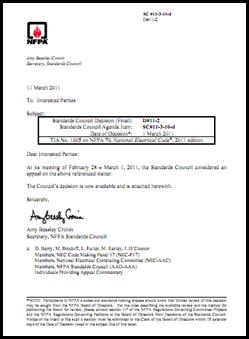TIA No. 1005 on NFPA 70, National Electrical Code®, 2011 edition

At its meeting of February 28 – March 1, 2011, the Standards Council considered an appeal from Carvin DiGiovanni of the Association of Pool and Spa Professionals, requesting that the Council issue proposed Tentative Interim Amendment (TIA) No. 1005 on the 2011 edition of NFPA 70, National Electrical Code® (NEC). The proposed TIA seeks to modify Section 640.42(B) to create two exceptions such that certain listed self-contained on- or above-grade outdoor spas and hot tubs would be exempt from the requirements for equipotential bonding of perimeter surfaces.
Proposed TIA No. 1005 was balloted through NEC Panel 17 and the Technical Correlating Committee (TCC) of the NEC in accordance with the NFP Regulations Governing Committee Projects, to determine if it had the necessary three-fourths majority support on merit and emergency nature to establish support for issuance. While the TIA passed the ballot of both Panel 17 and the TCC on merit (technical and correlation, respectively), it failed both the Panel and TCC on emergency nature. When a TIA fails to achieve the recommendation of the responsible Panel and TCC for issuance on both merit and emergency nature, under NFPA rules, the default recommendation of the codes and standards development process is to not issue the TIA.
The appeal requests that the Standards Council overturn the action recommended by the codes and standards development process, and issue the TIA. The Council has reviewed the entire record concerning this matter and has considered the written arguments put forth in this appeal. On appeal, the Council generally defers to the responsible Panel on technical issues, and here the Panel supported the technical merit of the TIA and the TCC supported the correlation merit. The TIA, however, failed the ballot on emergency nature by one vote with Panel 17, and three votes with the TCC. The question of emergency nature is one on which the Council gives less deference to the judgment of the Panel and TCC since evaluation of emergency nature often involves issues of a non-technical nature that the Council itself has an obligation to evaluate to ensure fairness in the treatment of subjects addressed by TIAs.
The Council concludes the TIA meets the test of emergency nature and accordingly has voted to uphold the appeal and issue TIA No. 1005.
http://www.nfpa.org/Assets/files/AboutTheCodes/70/FD11-3-10-d_D11-2_TIA_NFPA70.pdf